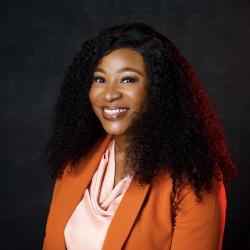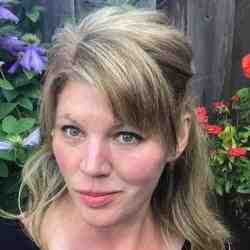Introducción
Agazi Afewerki has a powerful belief that any young person can teach an adult a new skill and that youth are a core resource for community development and transformation. With this idea, Agazi Afewerki is re-defining the role of youth in society, starting with the most vulnerable urban populations.
La idea nueva
Agazi’s new idea is to shift the paradigm towards youth as service-providers, rather than service-recipients, in intergenerational learning environments. The model activates the dual impact of developing young people’s confidence as changemakers while meeting community skill development needs.
Agazi first came up with this idea to tap the underutilized youth in newcomer communities to meet the needs of isolated immigrant adults. He noticed that communities with a high density of newcomer populations - where English literacy rates are low - tend to have a large youth population who speak both their parents’ native language and at least one of the official languages in Canada. Agazi was inspired to harness the ‘youth asset’ by leveraging their expertise in technology and language to established them as a critical and recognized support for adult newcomers to overcome barriers to integration. Agazi witnessed the youth teachers and adult learners mutually benefit from these lessons and together they developed confidence and learned new skills. He also witnessed the rate of assimilation for new immigrants improve drastically as a result of this relationship.
While Agazi’s new idea initiated in the context of underserved newcomer neighbourhoods, at the heart of his new idea is the notion that any child can teach an adult a new skill. Agazi’s vision is to reach all communities in need of skill development, and empower them to build meaningful connections across generations for increased inclusion and prosperity. As such, he is engaging practitioners and decision makers alike with this new idea to support them in recognizing the value of youth to ultimately engage them as service-providers for for community transformation.
El problema
At large, the problem that Agazi is addressing is the under-tapped potential of younger populations. There are low expectations of youth and this demographic is not viewed as being capable or engaged citizens. Knowledge on the value of young people in intergenerational learning environments and their service-provider capabilities is nearly non-existent. The Canadian Abacus Data poll on public attitudes regarding youth civic engagement reveals that a majority of Canadians believe that youth have too little influence on public policy, and 7 in 10 believe that young people are not prepared to be civic leaders in their communities.
These perceptions limit the availability of effective and meaningful youth engagement opportunities across Canada, and challenges are exacerbated in low-income neighbourhoods. For instance, take the mandated volunteer hours in secondary school curriculum in Canada. The Canadian Education Association’s report “Mandated Community Involvement” revealed that 46% of low-income youth forge or exaggerate their high-school volunteer hours, as compared to 5% in wealthier neighbourhoods. The cause appears to be due to the lack of meaningful and engaging volunteer opportunities in low-income areas. For instance, examples of volunteer postings for youth in these areas include bingo assistant, registration desk helper, and movie night volunteer.
Further to the issue of the lack of meaningful opportunities is that in the low-income neighbourhoods, disadvantaged youth face higher risk of illegal drug use, dropping out of school and criminality. According to the 2016 Toronto Vital Signs Report, the national youth unemployment was 15 percent. In contrast, Immigrant youth were especially vulnerable and experienced an even higher unemployment rate of 24%. The risk of not working is elevated for new immigrants as 46% of newcomers in Toronto live in poverty. In addition, young urban immigrants and second generation children face stigmatization and negative media portrayal. This contributes to low self-esteem, low self-efficacy and a feeling of disconnection from both their intimate community and the greater society. Without meaningful ways to engage and contribute to their community, these young people miss out on core benefits associated with volunteering - such as interpersonal, communication, organizational and managerial skills as identified by a Statistics Canada study.
While tackling the issue of de-valued and unengaged youth is the core thread to Agazi’s work, there is another side of Agazi’s idea that supports the improved provision of services to communities in need of skill development through reverse mentorship. For example, in immigrant communities where YEP initiated the program, they found that one of the biggest barriers to immigrant integration was language. Statistics Canada reports that six months after arrival, the language proficiency rate is about 66% for newcomer men, 52% for newcomer women, and remains relatively unchanged over time. Immigrants are twice as likely to be unemployed versus Canadian-born workers, reducing newcomers’ ability to support their families. In these circumstances, many immigrants turn to social support programs, creating an additional costly burden on these government funded initiatives.
The inability to communicate in one of Canada’s two official languages severely limits the number of successful interactions a newcomer can have with the people around them. For instance, while refugees have access to free healthcare, they may be unable to make a doctor’s appointment because of language barriers. It is not uncommon for newcomer adults to avoid venturing outside of their homes and immediate communities in order to avoid uncomfortable situations that require them to communicate in a new language. This leads to isolation which has a deteriorating effect on self-confidence, physical and mental health.
The Canadian government invests approximately $280 million annually in English and French language classes. According to a 2016 Citizenship and Immigration Canada (CIC) report, newcomer settlement initiatives cost more than one billion dollars between 2014 and 2015 and are projected to rise in the years to come. Even so, barriers to the CIC programs exist. For example, there are a lack of courses during weekends or at times when clients can attend. Agazi’s research indicates two major reasons that government-funded language programs fail. The first is that instruction is usually not language-specific. In a class where the learners’ first languages are diverse, delivering a standard, high-quality learning experience for every participant is difficult. The other challenge is the one-to-many instruction styles often required. Demand for these services is high, meaning that the instructor-to-learner ratios often exceed their optimal point, further lowering the quality of instruction. As such, these communities miss out on core opportunities to develop their skill sets for integration while youth remain unengaged and undervalued.
The aforementioned is simply one example of how newcomer communities commonly in need of skill development are not benefitting from their local youth assets for service provision. There are, however, countless adult communities who can unlock youth potential by relying on reverse mentoring to increase knowledge by mobilize youth as service providers.
La estrategia
After winning a UN Award in 2011 for his local community based reverse mentorship program, Agazi began to receive increased publicity and support for the work that he was doing to unlock youth potential in under-resourced communities. Agazi’s initiative was praised for the way in which he was able to leverage mandated volunteer hours required for high school graduation to access his young teachers. He was also recognized for setting up reverse-mentorship meetings in underutilized public spaces, such as schools and libraries to support its operation at a very low cost. As such, adult learners were able to access customized, one-on-one language tutoring for free. With the increased interest and demand for the program, Agazi decided to register Youth Empowering Parents (YEP) as a charitable organization in 2014. In 2018, YEP reached 3300 people - half youth and half adults - across four countries, with 20 community based programs mobilizing over 30,000 volunteer hours.
Agazi’s strategy to transform youth from service recipients to service providers is threefold: it includes an easily adaptable model, research that articulate the dual value of reverse-mentorship, and sector wide partnerships and trainings to support others to apply the model to support new communities and their needs.
Agazi developed the YEP structure to facilitate the transfer of new skills from youth to adults, in order to accelerate learning opportunities in marginalized communities and meaningfully engage youth. Agazi and his team call it “YEP in a box”; an online portal and learning tool, which provides customized training and course materials for community partners. This includes a sophisticated technology platform to match tutor with student, including simplified coordination based on gender preferences, location, schedules, etc. Secondly, it includes curriculum, including easy to follow teaching instructions for youth as young as 10 years old. YEP’s curriculum is specifically designed for the youth-adult interaction in public spaces, such as schools or libraries. Thirdly, they provide training for program operators, including instructional videos on how to operate a YEP program at a community level, instructional videos for youth as mentors, and parental permission forms.
In addition to the YEP in a box programming being implemented in collaboration with communities, YEP engages in research on reverse mentorship and its potential for social impact. For example, Agazi works with the Ontario Coalition for Workforce Innovation (OCWI), which includes colleges, universities, employment sector agencies and the government to identify programs that will support Ontario’s future labour needs. Together they conducted an external case study on the dual benefits of youth engagement in reverse-mentorship roles. An in-depth analysis of the program’s impact found a number of quantifiable benefits, which included higher grades, improved confidence, and increased volunteerism for the children and youth involved. For the adults and seniors who participated, they experienced a reduction in social isolation, gained more social capital, and accelerated integration. Research partnerships, such as with the OCWI have the potential to alter policy regarding government bodies and programs associated with youth and adult literacy development. In focussing on research and knowledge dissemination, Agazi is increasing opportunities to scale up into larger governmental systems to support the innovation adaptation more broadly.
Finally, Agazi uses both the YEP in a box programming and supporting research to engage in sector wide trainings, so that communities can understand the value and potential of youth as service providers. As such, Agazi aims to support practitioners and decision makers to take their own steps to engage youth in service-provider roles. The ABC Life Literacy Canada, for example, plans to use the YEP model to educate 11,000+ professionals about the value of youth, as well as establish a projected 400+ YEP “Learning Centres” across Canada where young people will demonstrate their value in their local communities. Because YEP research indicates a significant improvement in student achievement and parent engagement, Agazi has been able to develop new partnerships with the Ontario Ministry of Education and the Toronto District School Board. With these partners, Agazi and his team will train teachers on how to engage students in order to address community challenges by implementing the YEP reverse mentoring program in schools.
La persona
Agazi was a child when he came to Canada with his parents and younger brother as refugees from Eritrea. His father was educated at Oxford and his mother is a nurse. With the aid of others, they fled their country due to political unrest and violent conflict. Throughout their lives they sought opportunities to pay forward the kindness shown to them throughout their early struggles.
Agazi grew up in Regent Park, Canada’s largest, oldest and poorest social housing complex. A large newcomer population experiences high rates of poverty, illiteracy, unemployment, violence, drug abuse and crime in this neighborhood. More than 7,500 residents lived on just 69 acres of land, with an average household income of $14,000 per year.
While Agazi saw his high school colleagues improving their lives around through education, the negative media coverage of low-income communities was pervasive. Agazi observed that violent and drug related crimes in Regent Park would spike after media highlighted negative incidents in the community. This frustrated him, as the media spotlight on negative events influenced the way people behaved in the real world. For instance, when drug trade was emphasized in news reports, new drug dealers would enter the area thereby creating the conditions for turf wars and escalating conflict. Agazi was particularly concerned about youth internalizing negative labels used to describe his community and its members and thus he set out to challenge this narrative. He created a documentary to directly counter the media’s negative portrayal, which has been featured at a number of independent film festivals around Ontario.
Immersed in the values of his parents, Agazi learned the importance of service at a young age. As a high school student, he participated in the first cohort of Pathways to Education, a national program improving high school graduation rates in at-risk communities. In 2010, Agazi mobilized and founded the Pathways Alumni Association with 13 former participants to continue supporting young people beyond the program. The association developed into a vibrant organization in the community. Also in 2010, and equipped with his own experience as a young newcomer, Agazi co-founded YEP to address community pain points by unlocking the potential for youth to thrive as educators and service providers.

 Tile image
Tile image


